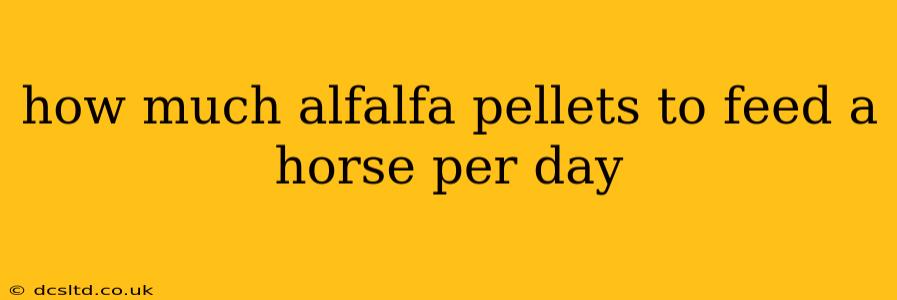Alfalfa pellets are a popular and convenient way to feed horses, providing a concentrated source of nutrients. However, determining the correct amount to feed your horse daily is crucial for maintaining their health and well-being. There's no single answer, as the ideal quantity depends on several factors. This comprehensive guide will help you understand how to calculate the appropriate daily allowance for your equine companion.
What Factors Determine Daily Alfalfa Pellet Intake?
Several key variables influence the amount of alfalfa pellets a horse needs each day. These include:
- Weight: A larger horse requires more calories and nutrients than a smaller one. Weight should be the primary factor determining the daily feed allowance.
- Age: Young, growing horses need more calories for development, while older horses might require adjusted diets to accommodate their changing metabolic needs.
- Activity Level: A horse in heavy work (e.g., competitive riding, strenuous farm work) burns more energy and needs a correspondingly higher caloric intake than a less active horse.
- Body Condition Score (BCS): This assesses your horse's fat reserves. A horse that's too thin needs more calories, while an overweight horse requires a reduced feed intake. Learning to assess BCS accurately is a valuable skill for every horse owner.
- Type of Work: The intensity and duration of work directly impact energy requirements. A horse performing light trail riding has different needs than one participating in endurance competitions.
- Overall Health: Any underlying health conditions, such as metabolic disorders like Cushing's disease or Equine Metabolic Syndrome (EMS), will influence dietary requirements, often necessitating a lower-calorie, higher-fiber diet. Consult your veterinarian for guidance in these cases.
- Other Feeds: If your horse receives hay, grain, or other supplements, the amount of alfalfa pellets should be adjusted accordingly to prevent overfeeding.
How to Estimate Daily Alfalfa Pellet Intake
There's no magic formula, but a general guideline is to start with a conservative estimate based on your horse's weight and activity level. Then, closely monitor their body condition score and adjust accordingly. For example:
- A 1000lb horse at moderate work might consume 4-6 lbs of alfalfa pellets daily. This is a starting point, not a rigid rule.
- A less active 1000lb horse might only need 2-4 lbs.
- A very active 1000lb horse may require 6-8 lbs or more, possibly supplemented with other high-energy feeds.
Remember, these are just estimates. Regularly assess your horse's weight and body condition to fine-tune the amount of alfalfa pellets they receive.
What About Hay? Alfalfa Pellets vs. Hay
Alfalfa pellets are often used as a supplement to hay, not a replacement. Hay provides crucial fiber, which aids digestion and supports gut health. Relying solely on pellets can lead to digestive issues. It's generally recommended to offer hay as the primary source of roughage, with pellets supplementing specific nutritional needs.
H2: Can I Overfeed Alfalfa Pellets?
Yes, overfeeding alfalfa pellets can lead to several health problems:
- Obesity: Excess calories lead to weight gain, increasing the risk of laminitis (inflammation of the sensitive laminae in the hoof), metabolic disorders, and other health issues.
- Digestive Upsets: Sudden changes in feed intake or excessive amounts of pellets can cause colic.
- Dental Problems: Overly hard pellets may damage teeth over time.
H2: My Horse Seems Hungry After Eating Their Alfalfa Pellets – What Should I Do?
If your horse appears hungry after their allotted amount of alfalfa pellets, it could indicate several possibilities:
- Insufficient Feed: Your horse may genuinely require more food due to their size, activity level, or other factors.
- Poor Quality Hay: If you're supplementing pellets with hay, the hay might not be providing enough nutrients, leading to increased hunger. Consider hay analysis to assess its nutritional value.
- Parasites: Internal parasites can increase appetite despite sufficient food intake. Regular deworming is essential.
- Underlying Health Condition: Various medical issues can influence appetite. Consult your veterinarian to rule out any underlying health concerns.
Always consult your veterinarian or an equine nutritionist for personalized advice regarding your horse's dietary needs. They can help you create a balanced feeding plan that supports your horse's health and optimal performance. Regular monitoring and adjustments are key to ensuring your horse receives the right amount of alfalfa pellets and maintains a healthy weight and condition.
